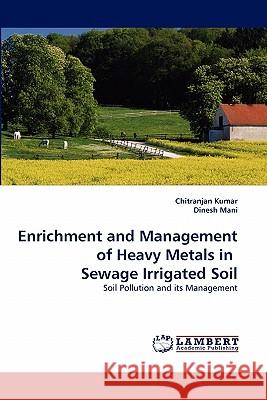Enrichment and Management of Heavy Metals in Sewage Irrigated Soil » książka
Enrichment and Management of Heavy Metals in Sewage Irrigated Soil
ISBN-13: 9783838398938 / Angielski / Miękka / 2010 / 132 str.
Sewage sludge as an uncalled for product of wastewater treatment poses the challenge to society of disposing of it. Application of sewage sludge to agricultural land may be beneficial because it can improve the physical, chemical and biological properties of soils which may enhance crop growth. While, sewage sludge contains various heavy metals and it contains a wide variety of pathogens and can be infectious for different species of animals and plants as well as for humans. Consequently environmentally sound decisions need to be based on an integrative evaluation of contaminant sources and transfer pathways. It is a need of time that phytoremediation must be approached as a multidisciplinary research effort. Success will ultimately depend on the employment of a holistic approach to integrate the work of plant biologist, soil microbiologist, agronomists, and environmental engineers.
Sewage sludge as an uncalled for product of wastewater treatment poses the challenge to society of disposing of it. Application of sewage sludge to agricultural land may be beneficial because it can improve the physical, chemical and biological properties of soils which may enhance crop growth. While, sewage sludge contains various heavy metals and it contains a wide variety of pathogens and can be infectious for different species of animals and plants as well as for humans. Consequently environmentally sound decisions need to be based on an integrative evaluation of contaminant sources and transfer pathways. It is a need of time that phytoremediation must be approached as a multidisciplinary research effort. Success will ultimately depend on the employment of a holistic approach to integrate the work of plant biologist, soil microbiologist, agronomists, and environmental engineers.











